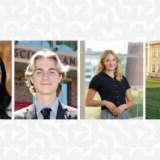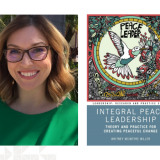
A Glimpse into Attallah and IES Fieldwork
April 28, 2021
Many students in the Attallah College of Educational Studies participate in variations of fieldwork in preparation for their future careers. But what exactly is fieldwork, and how is it beneficial for students?
Chapman’s Integrated Educational Studies (IES) undergraduate program defines fieldwork as “any course-related activity that occurs outside of the Chapman classroom.” Examples may include interviewing working professionals, visiting schools and classrooms for observations, or completing direct work under the supervision of a fieldwork site cooperating professional. Essentially, fieldwork is hands-on work in which students are directly witnessing perspectives that could provide them with insight about the field of education.
Course Embedded Fieldwork
Often, fieldwork is embedded into course curriculum. One such example is the observational fieldwork in the IES 103: Philosophy of Helping. This class requires that students visit and observe three “helping” organizations in the community (typically nonprofits) and reflect in a narrative format about what they notice.
Other examples of Attallah College courses with embedded fieldwork include IES 315: Non-Governmental Organizations, IES 314: Adult Learning, and IES 492: Senior Capstone. In the past, IES 206: Schools and Society course instruction has even taken place at the site of a local nonprofit based near the Chapman campus, Higher Ground Youth & Family Services, which provides after-school programming and mentoring for youth and their families in at-risk communities. In addition to examining current policies and practices in US education, the IES 206 students helped the Higher Ground kids with homework and offered one-on-one tutoring. This collaboration gives Chapman students hands-on teaching experiences while also positively impacting the larger Orange County community.
An example of fieldwork embedded in course curriculum at the graduate level is through Attallah College’s Kathleen Muth Reading Center tutoring program. Since 1978, the Muth Center has provided tutoring programs for elementary and middle school students in the local community. Attallah’s teaching candidates in the MA in Curriculum and Instruction (MACI) five-year accelerated program and the MA in Teaching (MAT) and MA in Special Education graduate programs are paired with an elementary or middle school student as part of a 12-week literacy and reading intervention program.
The tutoring program serves 100+ culturally and linguistically diverse students each year. Elementary and middle school students are chosen for this program based on their geographical proximity to Chapman. Due to the program’s popularity, there is a waitlist every term. When in-person, this instruction occurs in Reeves Hall on Chapman’s Orange campus, but due to the COVID-19 pandemic, the tutoring moved to a virtual platform in summer 2020.
Maggie Gallardo serves as the reading center’s director. She says that the tutoring process is beneficial for both the Chapman tutors and their tutees: “The tutors get to experience and create an authentic classroom environment, while the tutees benefit from personalized instruction over the course of the semester.”
External Fieldwork and Internships
While there are currently no mechanisms for undergraduate students to become involved with the Muth Center, there are multiple experiences that replicate the reading center’s intimate tutoring style.
Maggie suggests students meet with their fieldwork coordinator or program advisor to see if there are possible opportunities for virtual instruction observations they can take advantage of. While many fieldwork opportunities are connected to class requirements, fieldwork is beneficial outside of classes as well. Fieldwork can offer hands-on mechanisms for learning and networking opportunities.
Many organizations have adapted to virtual platforms and still provide tangible experiences for observers and interns. Here are a few examples:
- The Boys & Girls Club
- Blind Children’s Learning Center
- Casa de Amma
- CORE Athletics
- Discovery Cube
- Girls INC.
- Heritage Museum of OC
- Higher Ground
- L’Arche Wavecrest
- Orange County Children’s Therapeutic Arts Center
- Pretend City Children’s Museum
- Providence Speech and Hearing Center
- The Orange County Ronald McDonald House
- TGR Learning Lab
- The Wooden Floor
A last recommendation for a resource to utilize when searching for fieldwork opportunities is the networking platform Handshake. Handshake provides students and alumni listings for jobs and internships with companies that prioritize recruiting and hiring Chapman applicants.
Hannah Welsh ’22 is a junior double majoring in Psychology and IES (MACI ’23 emphasis), with a minor in Law, Justice, & Social Control.

